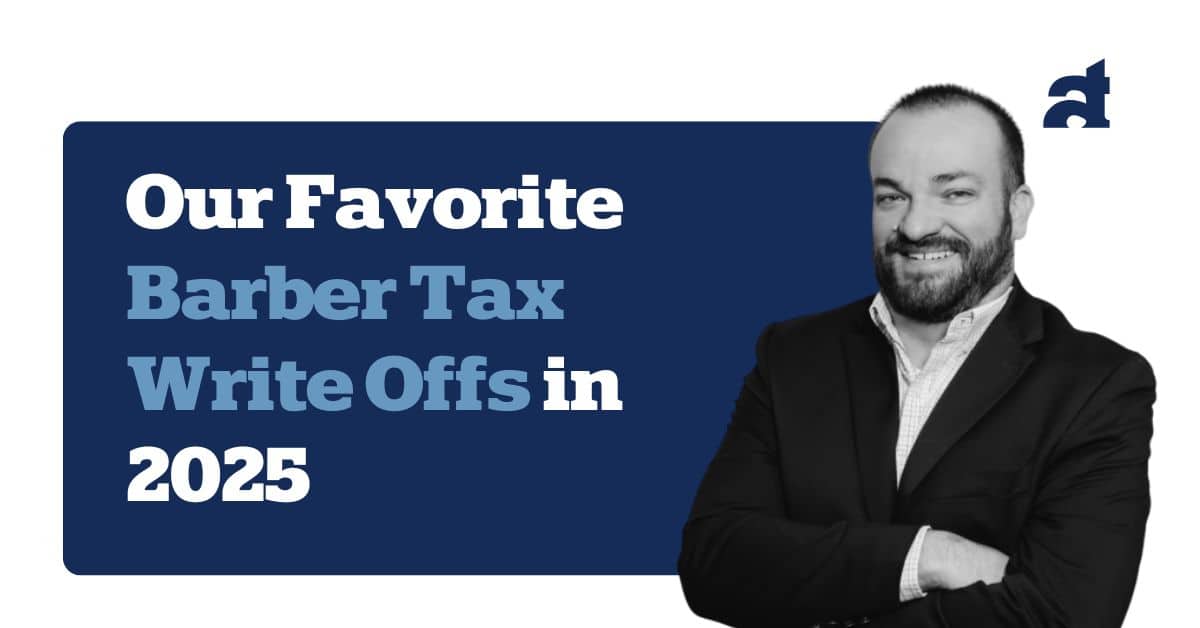
Running a barber business isn’t just about cutting hair—you’re keeping clients happy, upgrading your tools, managing appointments, and making sure everything runs smoothly.
But when tax season rolls around, a lot of barbers end up paying more than they should simply because they don’t know what they can write off.
The good news? There are plenty of barber tax write-offs designed to help you save money. The trick is knowing what qualifies.
So let’s go over the biggest tax write-offs barbers should be tracking in 2025 without all the confusing tax jargon.
As a barber, your skills are your business.
Whether you’re refining your fades, learning beard sculpting, or staying up to date on hair color trends, investing in education helps you stay competitive—and it’s tax-deductible.
The IRS allows deductions for professional education expenses as long as they’re related to your current trade.
This includes:
There’s no specific cap on how much you can deduct, but the key is that the education must be directly related to your work as a barber. If you’re attending a business course that helps you manage your barbershop better, that likely qualifies.
If you’re taking a class on real estate investing, that’s a personal expense and wouldn’t be deductible.
If you attend an industry expo in another city, your flights, hotel, and meals during the trip may also qualify as deductible business expenses. Keep track of all receipts and maintain a record of how the education ties back to your work.
Barbering is hands-on work, and accidents can happen. That’s why having insurance is so important—and the cost of protecting yourself and your business is fully deductible.
Types of insurance you can write off include:
For self-employed barbers, health insurance can be deducted as long as you’re not eligible for coverage through another employer or spouse’s plan. The deduction can cover premiums paid for yourself, your spouse, and dependents, but it cannot exceed the net income from your business.
If you own a shop and have employees, the cost of workers’ compensation insurance is also deductible.
Tips are a big part of a barber’s income, but they also come with tax obligations. The IRS requires service workers to report all tips, and failing to do so can result in penalties.
However, reporting tips properly can also work to your advantage.
There are special tax incentives for businesses that report tips accurately, such as the FICA Tip Credit for employers. While this mostly applies to shop owners with employees, independent barbers can also benefit by maintaining proper records.
To comply:
While there isn’t a direct tax credit for independent barbers, keeping clear records helps avoid underreporting issues, which can lead to audits or penalties.
If you do mobile barbering, house calls, or drive to purchase supplies, you can deduct vehicle-related expenses.
There are two ways to calculate your deduction:
Whichever method provides the greater deduction is the one you should use. To qualify, you need detailed records of mileage and expenses. Using an app like MileIQ or QuickBooks Self-Employed can make tracking easier.
If you travel out of town for a business-related event, your airfare, hotel, and meals may also be deductible. Just make sure they’re directly tied to your business.
Your tools are a necessary part of your work, and nearly everything you use daily is deductible.
These include:
For larger purchases, the IRS allows deductions under Section 179, which lets you write off up to $1,160,000 in equipment purchases instead of depreciating them over several years.
This is particularly useful if you invest in high-end barber chairs or expensive grooming tools.
If you rent a chair in someone else’s shop, the station rental fee is fully deductible as a business expense.
If you do any administrative work from home—like scheduling, bookkeeping, or marketing—you may qualify for a home office deduction.
There are two ways to calculate this:
To qualify, the space must be used exclusively for work. If your home office is also your gaming room, it won’t count.
Maintaining your barber license is a necessary business expense, and all related fees are deductible.
This includes:
Since licensing is required for your profession, these costs are considered ordinary and necessary business expenses and can be deducted in full.
Getting new clients requires promotion, and any money spent on advertising your services is tax-deductible.
This includes:
There’s no limit to how much you can deduct for marketing, as long as the expenses are reasonable and directly related to your business.
There are a few things you need to keep in mind in order to make sure you can claim every deduction you’re entitled to.
Throughout the year, make sure you are:
And if taxes feel overwhelming, working with a tax professional who understands barbering can help guarantee you’re maximizing your deductions and staying compliant with IRS rules.
Here at Adam Traywick, LLC, we help barbers & hair stylists across the country save as much money as legally possible every year in tax deductions. It’s what we do!
To see how we can help your business, simply head over to our Book a Call page to get in touch. We’re always here to help.
Until next time!